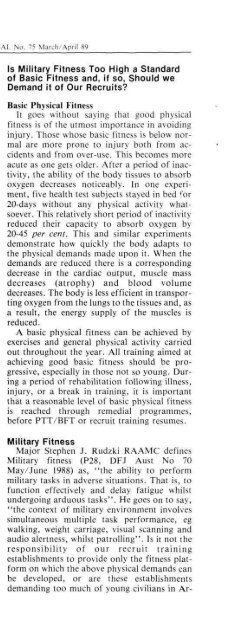ISSUE 75 : Mar/Apr - 1989 - Australian Defence Force Journal
ISSUE 75 : Mar/Apr - 1989 - Australian Defence Force Journal
ISSUE 75 : Mar/Apr - 1989 - Australian Defence Force Journal
- No tags were found...
Create successful ePaper yourself
Turn your PDF publications into a flip-book with our unique Google optimized e-Paper software.
AUSTRALIAN PUBLIC OPINIONS OF DEFENCE 41favoured by the majority of respondents was"to be as self-reliant as possible in defendingAustralia, but also to maintain our ties with ourallies." (This was, incidentally, the optionwhich most closely expressed the current<strong>Defence</strong> Policy). Related public opinionresearch undertaken in 1988 also found that ofthose people with a view on the alliance, 88%strongly supported it. 8It can be seen that opposition to somemanifestations of the alliance does not translateinto opposition to the alliance per se. Thepublic is aware that there are some costs involvedin the alliance, but the great majority believethat the benefits far outweigh these costs.Similarly complex findings were evident inrelation to public perceptions of Australia'sdefence capacity. ANOP found that in 1987,53% of respondents felt that Australia couldnot defend itself effectively. (This was a markeddrop from the 73% who considered this tobe true in 1980). Of the people holding this viewin 1987, the main reasons given to explain theirbeliefs were related to the size of the <strong>Defence</strong><strong>Force</strong>, the vastness of the coastline and theperception that the equipment was largely outdated.Of those 42% of respondents who wereconfident of Australia's defence capacity, themain reasons given were; Australia has a welltrained,effective <strong>Defence</strong> <strong>Force</strong>, the ADF iswell equipped and up to date, and thatAustralia's allies would lend assistance in theevent of an external threat.Aside from a dichotomy of views relating toequipment, the findings reveal a basic faith inthe capability of the <strong>Defence</strong> <strong>Force</strong>. Evenamong those who do not think that Australiacould defend itself effectively, their concernspertained to the size of the ADF and the efficacyof <strong>Defence</strong> equipment rather than thecapabilities of the personnel. As with thealliance issue, it can be seen that scepticismrelating to Australia's defence capacity doesnot necessarily reflect people's opinions of the<strong>Defence</strong> <strong>Force</strong>s.From their research over three surveys,ANOP concluded;"An important trend evident Irom theanalysis of these reasons is that the mostsignificant shifts have been related to the<strong>Defence</strong> <strong>Force</strong> and its capability (rather thanfactors related to geography, allies or defenceexpenditure), indicating the link between increasedcommunity confidence in Australia'sdefence capacity and the enhanced image ofthe ADF"."The FutureThe DPR sponsored research has producedsome significant and far-reaching findings concerningpublic opinion on <strong>Defence</strong>. It has beenable to reveal evident discrepancies betweenpopular assumptions and the statedbeliefs of some sections of the community. Inaddition, various areas of seemingly inconsistentor complex attitudinal standpoints havebeen clarified. Trends in public opinion, andchanges over time have been monitored in orderto obtain as accurate a picture as possible. Thisprocess will continue.Public opinion represents the perceptions ofthe community at a particular point in time,and is influenced by events, media portrayalsand popular ideologies. In circumstances wherethe public's level of knowledge on <strong>Defence</strong>issues is low, or where information emanatingfrom alternate sources has a negative bias, asituation exists which allows misnomers andnegative opinions among some sections of thecommuunity to persist. The Chief of the<strong>Defence</strong> <strong>Force</strong> has highlighted this issue;"Political expediency often means that untruthsare publicised, or conversely that thetruth is hidden. Both, if they are uncheckedrun the risk of causing <strong>Australian</strong>s to loseconfidence in the ADF, depresses the ADFitself and, of a more serious concern, sendsthe wrong signals to neighbours and allies." 1This situation indicates the particular needfor the provision of accurate information to thepublic which is interesting, well presented andpositive. There is an obvious lack of knowledgeand understanding in the population on various<strong>Defence</strong> issues, despite the fact that there is acorresponding interest in these issues.It is evident that a strong supportive base existsfrom which communications activities canbe projected to relevant sections of the community.Further research is now being plannedwhich will examine the underlying value systemheld by <strong>Australian</strong>s, and how this impacts onpublic opinion regarding Detence issues. Currentinitiatives will identify the best ways to addressthe specific information and education requirementsof various sections of the community,and to capitalise on the existing levels ofsupport and high regard for the ADF. II

















